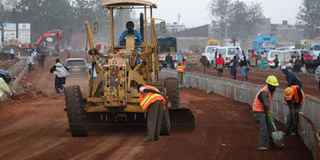Sh21bn city roads project dropped over loan delay

Construction works on Outering Road in Nairobi continue on October 3, 2016. PHOTO | FILE | NATION MEDIA GROUP
What you need to know:
- December 31 was the deadline for the project, whose total cost was $300 million (about Sh30.5 billion).
- Kenya National Highways Authority said the government hopes to negotiate a better loan deal with the World Bank.
- In recent years, Kenya ditched the Bank as its traditional lending partner and turned to China as a lender of first preference for infrastructure and other investments.
The government has cancelled a $208.2 million (Sh21.2 billion) loan from the World Bank to end traffic congestion in Nairobi city.
The National Treasury now says the National Urban Transport Improvement Project cited poor performance for the cancellation, on top of the fact that only 20 per cent of the loan amount has been received so far.
“The objective of the project was to improve the efficiency of the road transport along the northern corridor, improve the institutional and capacity and arrangements in the urban transport sub-sector and promote private sector participation in the operation, financing and management of transport systems,”
Treasury Secretary Henry Rotich said in a December 21 letter addressed to the World Bank Kenya Office Country Director Carlos Felipe Jaramillo. “The project has performed poorly since inception. It has only disbursed 20 per cent of total loan. In view of this, the government has decided to have the credit cancelled and resources reallocated to fast-performing projects,” Mr Rotich said.
LOAN DEAL
December 31 was the deadline for the project, whose total cost was $300 million (about Sh30.5 billion). “The purpose of this letter is to request to cancel this credit,” added Mr Rotich. Transport officials moved to allay concerns that efforts to decongest the city had been left in limbo.
Kenya National Highways Authority (KeNHA) said the government hopes to negotiate a better loan deal with the World Bank. “The repackaged financing is meant to include the Bus Rapid Transit,” Director-General Peter Mundinia said in an interview.
It was not immediately clear how much Kenya had already sunk into the project. The World Bank could not be reached for comment.
In recent years, Kenya ditched the Bank as its traditional lending partner and turned to China as a lender of first preference for infrastructure and other investments as a result of the Bretton Woods firm’s slow processes and bureaucracy.
DECONGEST NAIROBI
However, the Bank has held that its processes are meant to safeguard and uphold its fiduciary standards. The first part of the three-pronged project was to support KeNHA to upgrade the urban road transport infrastructure.
Under the project, Kenya would see the construction of Nairobi’s first double-decker highway linking Jomo Kenyatta International Airport (JKIA) to the Nairobi-Nakuru highway.
The multibillion elevated highway, meant to decongest central Nairobi, has been on the cards for nearly a decade. The first attempt collapsed after the World Bank pulled out, citing the inclusion of banned figures in the list of contractors.
The first component of the World Bank project involved constructing and rehabilitating non-motorised transport facilities, including foot paths, cycle tracks, pedestrian bridges and underpasses.
A feasibility study and detailed engineering designs of roads adjoining major towns, and studies to improve traffic flow through provision of technical advisory services, were part of the project.





